If you want to drive more web traffic to your retail website, one of the most affordable ways to do so is through retail SEO.
SEO is a great digital marketing channel for local and small businesses because people use search engines on a daily basis to discover retailers in their local area. If you also sell your products on an ecommerce website, SEO can help you bring new visitors to your website, meaning more sales and market share for your retail business.
But regardless of whether customers prefer to shop in physical stores or virtual ones, they are most likely to discover new retailers through search engines like Google. Thus, it is important for you to optimize not only physical store operation but also eCommerce websites and social channels to drive more sales from different channels.
The below guide will highlight the key details of an effective retail SEO strategy. If you follow the below tips, you can drive more web traffic and foot traffic for years to come.
What is Retail SEO?
Retail SEO refers to the practice of optimizing your ecommerce site for search engine traffic.
The main goal of retail SEO is to rank on the first page of search results for relevant keywords and phrases that potential customers use when looking for products or services like yours. With retail SEO, retail websites can increase their search traffic, generate more leads, and ultimately increase sales.
Almost 59% of all website traffic comes from mobile devices, and every day, shoppers use their phones to discover new shops, restaurants, and services in their local area.
If your business also includes a brick-and-mortar store, retail SEO can help you rank in the Google Map Pack for location-based searches.
What are the Benefits of Retail SEO?
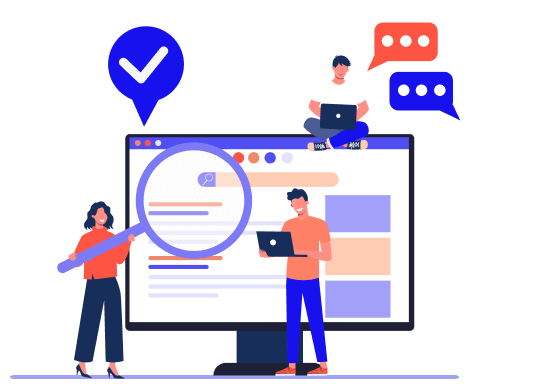
If you’re not quite sure whether you want to invest in retail SEO strategies, here are some of the major benefits of ecommerce SEO.
- Reach a larger audience: By ranking for keywords that are relevant to your products and services, you can reach your target audience, expanding your market share
- Bring value to users: By creating high-quality, valuable content for your users, you’ll increase brand loyalty, expertise, and authority
- Promote your products or services: Retail SEO gives you more opportunities to promote your products and services through content strategy
- Drive website traffic at a low cost: SEO is known for its affordability in comparison to other marketing strategies like social media ads, search ads, or display ads
- Increase foot traffic: By ranking in the Google Map Pack, you’ll bring more new customers into your physical store
Even just a small investment in local SEO optimization can mean major increases in website traffic, foot traffic, sales, and revenue.
3 Main Retail SEO Strategies
There are three primary areas of search engine optimization that your retail store can focus on:
On-Page SEO
On-page SEO is the process of optimizing individual web pages to improve their rankings and visibility in the SERPs. It involves all of the elements “on-page,” such as the copy, HTML source code, schema markup, images, videos, design, outbound and internal links, and the page structure.
For retail stores, this process involves making sure your product pages are optimized for those keywords that will bring your website (and your physical store) audiences who are looking for products and services like yours.
Technical SEO
Technical SEO is all about the performance of our websites and the technical elements that Google uses to evaluate web pages.
Technical SEO focuses mainly on website elements like site architecture, site speed, security, and mobile-friendliness. It also refers to removing issues that may negatively impact your SEO performance such as broken links, orphan pages, redirect chains, and other issues that can prevent indexing by search engines.
Off-Page SEO
Off-page SEO are factors that occur “off-page,” meaning on other websites. Google users off-page factors to understand how trustworthy and reputable your website is in your industry and in comparison to your competitors. Off-page SEO primarily includes backlinks, or links on other websites to your website, but it can also refer to brand mentions, social signals, and reviews on third-party websites.
5 Retail SEO Tips for Increasing Organic Traffic
So how exactly do you optimize your retail website for better search engine rankings?
The below retail SEO tips will pack the biggest punch for improving your total keyword rankings and organic visibility in the shortest amount of time.
Optimize your website for local search
For brick-and-mortar retail stores, it’s essential that your retail website ranks for location-based searches. Some examples of location-based searches include queries like “coffee shops near me,” or “vegan food Dallas.”
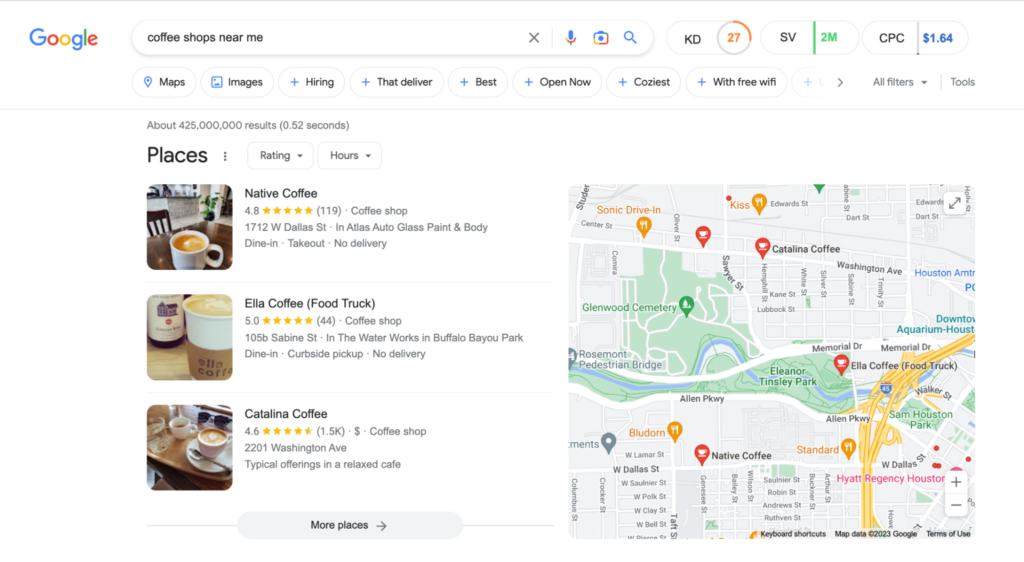
Google determines local search results by the following criteria:
- Distance: Businesses with geographic proximity to the user’s IP address
- Relevance: Web pages that have strong topical relevance to the user’s keyword query
- Prominence: Websites that have more prominence based on off-page factors like citations, backlinks, reviews, and more
In order to prove your ecommerce site’s signals for these three factors, make sure you perform the following optimizations:
- Include the physical address of your retail store somewhere on your homepage. One easy way to do this is by adding it to your footer.
- Optimize your web pages for relevant keyword searches and phrases using a content optimizer. The higher your content score, the more ranking potential you’ll have for your target keywords.
- Sign up for NAP listing services to confirm that your off-site business listings are always up-to-date and consistent. That means current address, phone number, hours of operation, etc.
Keep your Google Business Profile Active and Up-to-Date
When users search for your retail business by brand name, Google will automatically show them your Google My Business Profile listing, as long as you have created your profile.
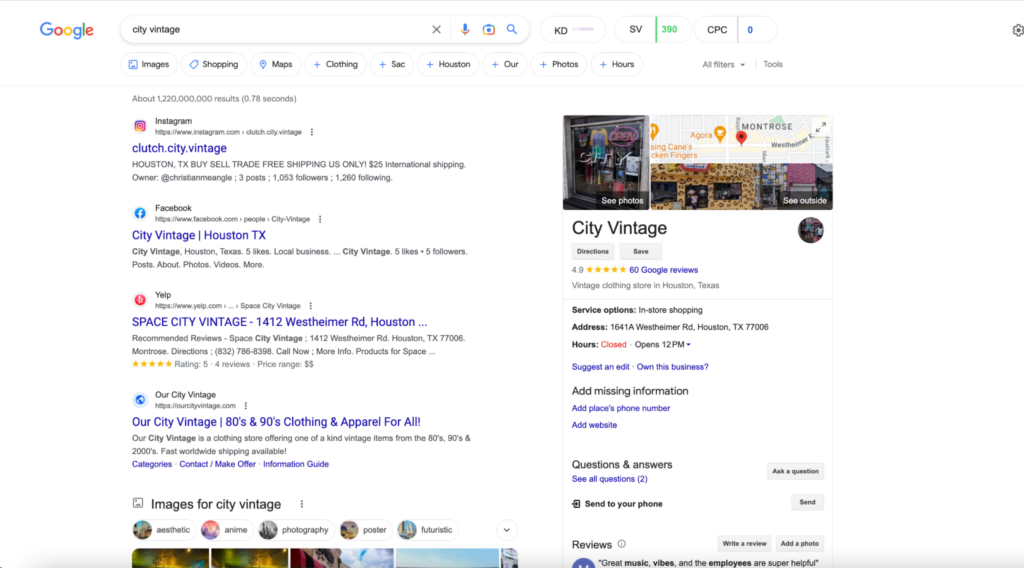
For this reason, it’s important that you set up your Google Business Profile and that it includes the most accurate information about your business.
Your Google Business Profile panel will also look more informative and attractive to searchers if it is populated with relevant information like contact information, answers to common questions, current photos, and lots of customer reviews.
According to a BrightLocal survey, 60% of customers say the number of reviews a business has is critical in determining whether to use its services, so make sure you incentivize your existing customers to leave reviews, particularly if you know that they have had a positive experience.
Create content on a consistent basis
Consistently publishing blog content on your retail website can help you rank for more keywords that have relevance to your products and services.
Blog content also brings value to your website visitors and current customers and allows you to showcase your products or services in new ways. You can also use your SEO blog content in other digital channels, like sharing on social media or in your email marketing campaigns.
If you’re not sure what to write about, use a blog ideas generator to discover ideas, topics, and article titles. Simply enter the search queries you identified during the keyword research process, and the SEO tool will suggest relevant article titles and descriptions.
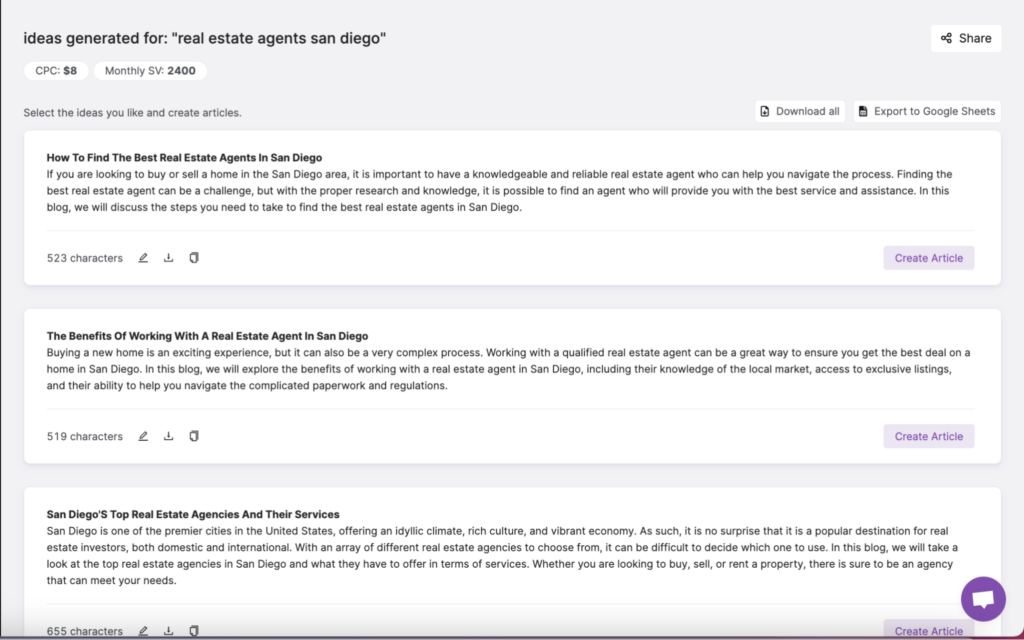
Google likes to see websites that are experts in their industry and display expertise in relevant topic areas. You can use a keyword research tool or content planner tool to help you start the process of regular content production for your retail website..
If you don’t have in-house writers on your team, consider hiring freelance writers or outsourcing your blog content to a content writing agency. In terms of increasing the total number of keywords your retail website ranks for, there is no better way than consistently publishing content.
Run regular site audits
Most small business owners don’t have extensive knowledge of the technical elements of their website. That’s why a site auditing tool can automate the work of technical SEO for you, helping you keep your ecommerce store in tip-top shape.
Tools like SearchAtlas will send you automatic notifications whenever an issue that could negatively impact your SEO performance is detected on your website.
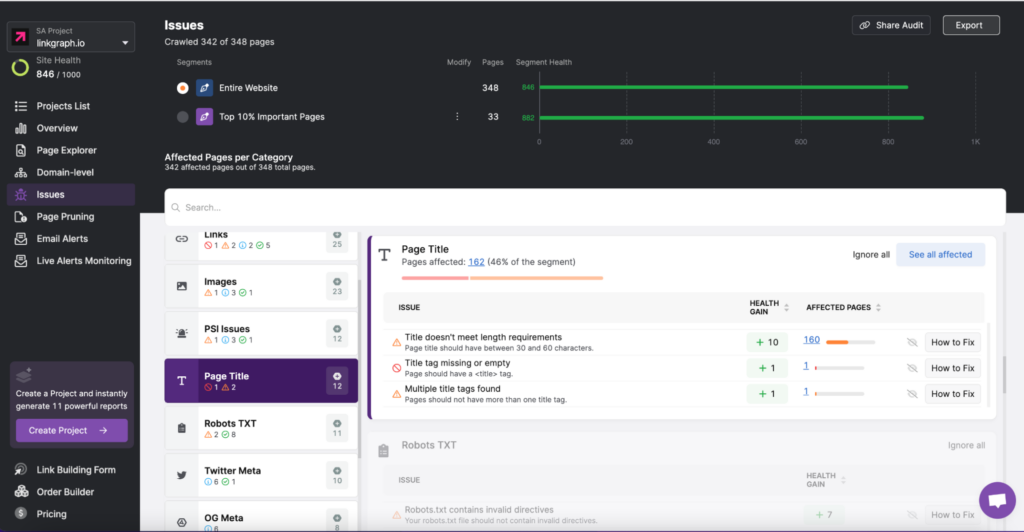
A site auditor tool will check for issues like:
- Missing title tags, meta descriptions, and proper character length
- Broken links, orphan pages, redirect chains
- Failed Core Web Vitals or low PSI scores
- Invalid robots.txt
- Missing sitemaps, image alt text, canonical tags, etc.
- And more!
Simply hand over your site audit report to a web developer and they will have the exact roadmap to resolve any issues on your retail website.
Launch a link building campaign
Backlinks are Google’s number one ranking factor, even for local SEO. Google relies on backlinks because they show that your retail website is trusted by other websites in your industry.
There is no better way to get a jumpstart in organic traffic to your website than by building backlinks. One of the best ways to do backlink building is through high-quality content like guest posts, public relations outreach, or digital PR.
Link building can be time-consuming, so investing in link building services from a reputable agency may be the best choice for your retail business. But you can also reach out to local newspapers, food bloggers, influencers, or others on your own, asking if they will consider linking to your website or content.
Final Thoughts on Retail SEO
Taking the time to invest in some combination of on-page, off-page, and technical SEO is the fastest way to get started seeing results in retail SEO. With page one rankings for relevant keywords, you’ll always have a steady stream of web traffic and foot traffic at a low customer acquisition cost.

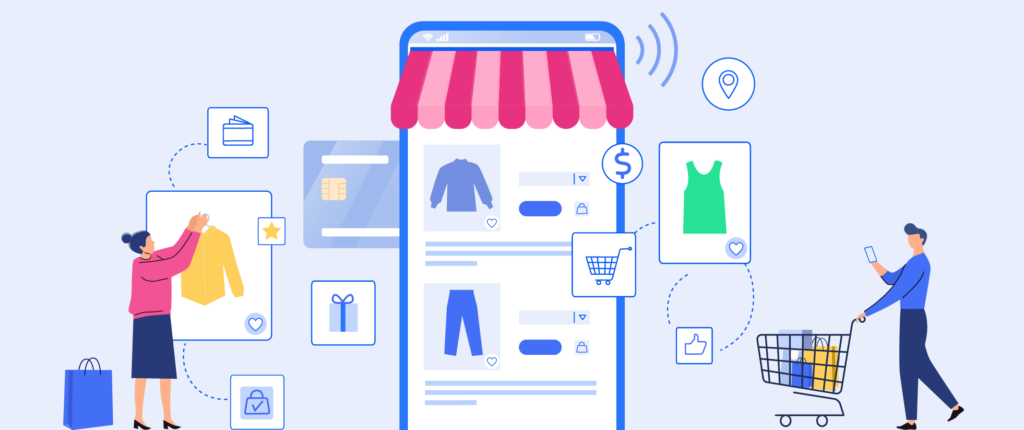
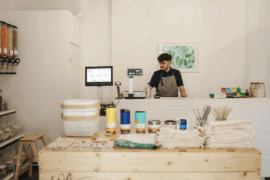
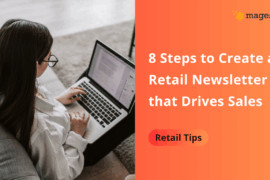

2 Comments
Great insights on the importance of retail SEO! Investing in a comprehensive SEO strategy that includes on-page, off-page, and technical optimization is indeed crucial for achieving desirable results. Securing page one rankings for relevant keywords not only drives consistent web traffic but also enhances foot traffic to physical stores, all while keeping customer acquisition costs low. It’s an effective approach to boost visibility, attract potential customers, and ultimately drive business growth. Thanks for sharing these valuable thoughts!
Great insights on optimizing retail websites for better search engine rankings!
The tips provided are practical and effective, especially the emphasis on local SEO.
Thanks for sharing these valuable tips!